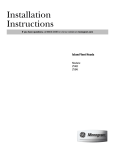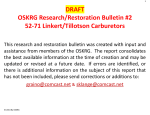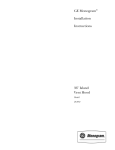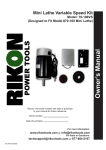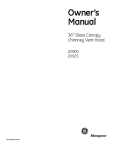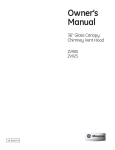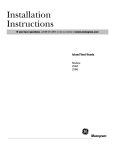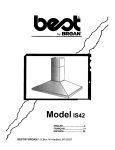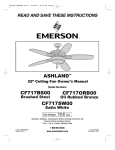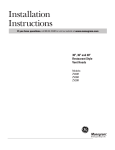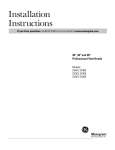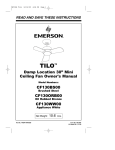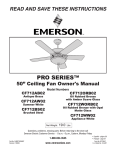Download Monogram ZV925 Owner`s manual
Transcript
Installation Instructions 36″ Island Chimney Vent Hood ZV925 49-80329 05-06 JR 04-06 JR 49-80406 Printed in Italy 7-1/16″ to Centerline of Holes Drill 3/16″ Pilot Holes Approx. 1-1/2″ Deep Cut a 1″ Dia. Wire Access Hole 2″ 1/ 8- . ia D 10-1/16″ to Centerline of Holes 36″ Hood Template FRONT OF HOOD Cut a 1″ Dia. Wire Access Hole 7-1/16″ to Centerline of Holes Drill 3/16″ Pilot Holes Approx. 1-1/2″ Deep Installation Instructions WARNING: TO REDUCE THE BEFORE YOU BEGIN RISK OF FIRE, ELECTRICAL SHOCK OR INJURY, OBSERVE THE FOLLOWING: A. Use this unit only in the manner intended by the manufacturer. If you have any questions, contact the manufacturer. B. Before servicing or cleaning unit, switch power off at the service panel and lock service panel to prevent power from being switched on accidentally. If the service panel cannot be locked, fasten a tag or prominent warning label to the panel. Read these instructions completely and carefully. •IMPORTANT – Save these instructions for local inspector’s use. •IMPORTANT – Observe all governing codes and ordinances. • Note to Installer – Be sure to leave these instructions with the Consumer. • Note to Consumer – Keep these instructions for future reference. • Skill Level – Installation of this vent hood requires basic mechanical and electrical skills. • Completion time – 1 to 3 hours. • Proper installation is the responsibility of the installer. • Product failure due to improper installation is not covered under the Warranty. AVERTISSEMENT : POUR RÉDUIRE LE RISQUE D’INCENDIE, DE CHOC ÉLECTRIQUE OU DE BLESSURES, IL FAUT OBSERVER LES REGLES SUIVANTES : A. Utilisez cet appareil uniquement de la maniére prévue par le fabricant. En cas de question, consultez le fabricant. B. Avant toute intervention ou nettoyage, coupez l’alimentation électrique au disjoncteur et verrouiller le panneau du disjoncteur pour éviter la mise sous tension accidentelle. S’il n’est pas possible de verrouiller le panneau du disjoncteur, attachez un placard ou une étiquette trés visible au panneau. • For general ventilating use only. Do not use to exhaust hazardous or explosive materials or vapors. • Structural framing, installation work and electrical wiring must be done by qualified person(s) in accordance with all applicable codes and standards, including fire-rated construction. • Sufficient air is needed for proper combustion and exhausting of gases through the flue (chimney) of fuel burning equipment to prevent back drafting. Follow the heating equipment manufacturer’s guidelines and safety standards such as those published by the National Fire Protection Association (NFPA), and the American Society for Heating, Refrigeration and Air Conditioning Engineers (ASHRAE), and the local code authorities. • Local codes vary. Installation of electrical connections and grounding must comply with applicable codes. In the absence of local codes, the vent should be installed in accordance with National Electrical Code ANSI/NFPA 70-1990 or latest edition. CAUTION: Due to the weight and size of these vent hoods and to reduce the risk of personal injury or damage to the product, THREE PEOPLE ARE REQUIRED FOR PROPER INSTALLATION. PRUDENCE : À cause du poids et des dimensions du ces hottes et pour réduire les risques de blessures ou de dommages du produit, IL FAUT TROIS PERSONNES POUR FAIRE UNE INSTALLATION CORRECTE. WARNING: To reduce the risk of fire or electrical shock, do not use this range hood with any external solid-state speed control device. Any such alteration from original factory wiring could result in damage to the unit and/or create an electrical safety hazard. AVERTISSEMENT : Pour réduire le risque d’incendie ou de choc électrique, il ne faut pas utiliser cette hotte avec un régulateur de vitesse électronique externe. Toute modification de ce type du branchement d’usine peute endommager l’appareil ou créer un risque de choc électrique. CAUTION: To reduce risk of fire and to properly exhaust air, be sure to duct air outside. Do not vent exhaust air into spaces within walls or ceilings or into attics, crawl spaces or garages. TO REDUCE THE RISK OF FIRE, USE ONLY METAL DUCTWORK. PRUDENCE : Il faut prendre soin d’installer un conduit vers l’extérieur pour réduire le risque d’incendie et pouvoir évacuer l’air correctement. Il ne faut pas évacuer l’air dans l’espace entre les parois d’un mur, un plafond ou un grenier, un espace sanitaire ou un garage. 2 Design Information CONTENTS Design Information Product Dimensions ..............................................................................3 Advance Planning Advance Planning ..................................................................................4 Power Supply ............................................................................................4 Duct Fittings ............................................................................................ 5 Installation Preparation Installation Height ..................................................................................6 Tools and Materials Required............................................................7 Remove the Packaging ......................................................................7 Parts Provided ..........................................................................................8 Installation Preparation Construct Ceiling Support ..........................................................9–11 Installation Instructions—Vented to the Outside Step 1, Mount Template ....................................................................12 Step 2, Adjust Frame Height ..........................................................12 Step 3, Cut Duct to Length for Vented Installation ............13 Step 4, Install the Support Frame ................................................13 Step 5, Install Hood Attachment Screws..................................13 Step 6, Mount the Hood onto the Support..............................14 Step 7, Connect Cables......................................................................14 Step 8, Connect Electrical ................................................................15 Step 9, Prepare the Duct Covers ..................................................16 Step 10, Install Upper Duct Cover................................................16 Step 11, Install Lower Duct Cover................................................17 Step 12, Install Duct Cover Trim....................................................17 Step 13, Install Metal Filter ..............................................................17 Step 14, Finalize Installation............................................................17 Installation Instructions—Recirculating Step 1, Mount Template ....................................................................18 Step 2, Adjust Frame Height ..........................................................18 Step 3, Install Air Deflector, Cut Duct for Recirculating Operation ............................................19 Step 4, Install Upper Support Frame..........................................19 Step 5, Install Lower Structure to Upper Structure ............20 Step 6, Install Blower/Motor............................................................20 Step 7, Install Hood Attachment Screws..................................21 Step 8, Mount the Hood onto the Support..............................21 Step 9, Connect Cables......................................................................21 Step 10, Connect Electrical..............................................................22 Step 11, Prepare the Duct Covers................................................23 Step 12, Install Upper Duct Cover................................................23 Step 13, Install Lower Duct Cover................................................24 Step 14, Install Duct Cover Trim....................................................24 Step 15, Install Filters ..........................................................................25 Step 16, Finalize Installation............................................................25 PRODUCT DIMENSIONS *Height *Height to ceiling Ceiling 24″ min.* 30″ max.* 3/4″ 32 1/4" 6" 27 9/1 9/16″ 27 7/8" 35 35 7/8″ 36″ min. * The supplied duct cover fits 7′ 11″ to 9′ ceiling heights. For 9′ 1″ to 10′ 1″ ceilings, order ZX92510. * Exact installation height depends on ceiling height. NOTE: Installation height should be measured from the cooking surface to the bottom of the outer glass portion of the hood. These vent hoods are supplied with a support frame for ceiling heights of 7′ 11″ to 10′ 1″. Decorative duct covers conceal the ductwork running from the top of the hood to the ceiling. ZX92510 accessory is available for ceiling heights of 9′ 1″ to 10′ 1″. This hood must be installed 24″ min. and 30″ max. above the cooking surface. The cooking surface should be at least 36″ above the floor. This hood may be vented to the outdoors, or it can be installed for recirculating operation. This hood can be installed over any Monogram electric or gas cooktop. It cannot be installed over a Monogram Professional cooktop or range. 3 Advance Planning ADVANCE PLANNING POWER SUPPLY Ductwork Planning •These vent hoods are equipped for 8″ round ductwork. •Determine the exact location of the vent hood. •Plan the route for venting exhaust to the outdoors. •Use the shortest and straightest duct route possible. For satisfactory performance, duct run should not exceed 100 ft. equivalent length for any duct configurations. •Refer to “Duct Fittings” chart to compute the maximum permissible length for duct runs to the outdoors. •Use rigid metal ductwork only. •Install a roof cap with damper at the exterior opening. Order the cap and any transitions needed in advance. IMPORTANT - (Please read carefully) WARNING: FOR PERSONAL SAFETY, THIS APPLIANCE MUST BE PROPERLY GROUNDED. ATTENTION : POUR DES RAISONS DE SÉCURITÉ, CET APPAREIL DOIT ÊTRE CORRECTEMENT MIS À LA TERRE. Remove house fuse or open circuit breaker before beginning installation. Do not use an extension cord or adapter plug with this appliance. Follow National electrical codes or prevailing local codes and ordinances. Electrical Supply This vent hood must be supplied with 120V, 60Hz, and connected to an individual, properly grounded branch circuit, and protected by a 15 or 20 amp circuit breaker or time delay fuse. • Wiring must be 2 wire with ground. • If the electrical supply does not meet the above requirements, call a licensed electrician before proceeding. • Route house wiring in the ceiling, as close to the installation location as possible. Allow additional length from ceiling joists to reach the junction box on the bottom of the hood support frame. • Connect the wiring to the house wiring in accordance with local codes. Grounding Instructions The grounding conductor must be connected to a ground metal, permanent wiring system, or an equipment-grounding terminal or lead on the hood. Ceiling Framing for Adequate Support •These vent hoods are heavy. Adequate structural support must be provided. The ceiling structure must be capable of supporting the weight of the hood and any inadvertent user contact loads (approximately 200 pounds). The hood support frame will be supported by 2 x 4 cross framing. •Installation will be easier if the vent hood is installed before the cooktop or countertop below is installed. Accessory Duct Cover •All models are shipped with a duct cover for ceiling heights of 7′ 11″ to 9′. ZX92510 accessory 36-3/4″ duct cover is available to reach 9′ 1″ to 10′ 1″ ceiling heights. The accessory should be ordered with the hood and be on site before final framing and wall finishing. WARNING: The improper connection of equipment-grounding conductor can result in a risk of electric shock. Check with a qualified electrician or service representative if you are in doubt whether the appliance is properly grounded. AVERTISSEMENT : Le mauvais branchement du fil de mise à la terre peut causer un choc électrique. En cas de doute, consultez un électricien qualifié ou un technicien pour déterminer si l’appareil est à la terre. 4 Advance Planning DUCT FITTINGS Use this chart to compute maximum permissible lengths for duct runs to outdoors. NOTE: Do not exceed maximum permissible equivalent lengths! Maximum duct length: 100 foot for 8″ round duct Flexible ducting: If flexible metal ducting is used, all the equivalent feet values in the table should be doubled. The flexible metal duct should be straight and smooth and extended as much as possible. DO NOT use flexible plastic ducting. NOTE: Any home ventilation system, such as a ventilation hood, may interrupt the proper flow of combustion air and exhaust required by fireplaces, gas furnaces, gas water heaters and other naturally vented systems. To minimize the chance of interruption of such naturally vented systems, follow the heating equipment manufacturer’s guidelines and safety standards such as those published by NFPA and ASHRAE. This Hood Must Use an 8″ Round Duct. Duct Piece Dimensions Round, straight Equivalent Length* 1 ft. (per foot length) 3-1/4″ x 12″ 3-1/4″ x 24″ straight 1 ft. (per foot length) 8″ round 90° elbow 17 ft. 8″ round 45° elbow 10 ft. 3-1⁄4″ x 12″ 90° elbow 15 ft. 3-1/4″ x 12″ or 45° elbow 9 ft. 3-1/4″ x 12″ 90° flat elbow 36 ft. 8″ round to 3-1/4″ x 12″ or 3-1/4″ x 24″ transition 2 ft. 3-1/4″ x 12″ to 8″ round transition 2 ft. 8″ round to 3-1/4″ x 12″ or transition 90° elbow 6 ft. Total Quantity Equivalent Used Length 3-1/4″ x 12″ to 8″ round round transition 90° elbow 5 ft. 8″ round wall cap with damper 24 ft. without damper 32 ft. with damper 3-1/4″ x 12″ wall cap with damper 19 ft. without damper 26 ft. with damper 8″ round roof cap 44 ft. *Actual length of straight duct plus duct fitting equivalent. Equivalent length of duct pieces are based on actual tests conducted by GE Evaluation Engineering and reflect requirements for good venting performance with any ventilation hood. 5 Total Duct Run Installation Preparation Possible Hood Mounting Ceiling Installation Frame Trim Piece Height Height (inches) Height (inches) Needed 7′ 11″ 26 30 1/2 A 8′ 27 30 1/2 A 8′ 1″ 24 34 1/2 B 8′ 1″ 28 30 1/2 A 8′ 2″ 25 34 1/2 B 8′ 2″ 29 30 1/2 A 8′ 3″ 26 34 1/2 B 8′ 3″ 30 30 1/2 A 8′ 4″ 27 34 1/2 B 8′ 5″ 24 38 1/2 C 8′ 5″ 28 34 1/2 B 8′ 6″ 25 38 1/2 C 8′ 6″ 29 34 1/2 B 8′ 7″ 26 38 1/2 C 8′ 7″ 30 34 1/2 B 8′ 8″ 27 38 1/2 C 8′ 9″ 24 42 1/2 D 8′ 9″ 28 38 1/2 C 8′ 10″ 25 42 1/2 D 8′ 10″ 29 38 1/2 C 8′ 11″ 26 42 1/2 D 8′ 11″ 30 38 1/2 C 9′ 27 42 1/2 D ZX92510 Accessory Duct Cover 9′ 1″ 24 46 1/2 E 9′ 1″ 28 42 1/2 D 9′ 2″ 25 46 1/2 E 9′ 2″ 29 42 1/2 D 9′ 3″ 26 46 1/2 E 9′ 3″ 30 42 1/2 D 9′ 4″ 27 46 1/2 E 9′ 5″ 24 50 1/2 F 9′ 5″ 28 46 1/2 E 9′ 6″ 25 50 1/2 F 9′ 6″ 29 46 1/2 E 9′ 7″ 26 50 1/2 F 9′ 7″ 30 46 1/2 E 9′ 8″ 27 50 1/2 F 9′ 9″ 24 54 1/2 G 9′ 9″ 28 50 1/2 F 9′ 10″ 25 54 1/2 G 9′ 10″ 29 50 1/2 F 9′ 11″ 26 54 1/2 G 9′ 11″ 30 50 1/2 F 10′ 27 54 1/2 G 10′ 1″ 28 54 1/2 G DETERMINE INSTALLATION HEIGHT • Decorative duct covers are provided to conceal the ductwork running to the ceiling. • This hood can be installed for recirculating operation. No kits required. The hood installation height, from the cooking surface to the bottom of the hood, depends upon ceiling height. For optimum performance, the hood must be 24″ min. and 30″ max. above the cooking surface. Use the chart on this page to accurately determine installation height and support frame adjustment, and to select the correct size top trim piece (A, B, C or D). D C B A ZX92510 Accessory Duct cover includes a 36-3/4″ long duct cover and 3 sets of duct cover top trim pieces labeled E, F, G. 6 Installation Preparation TOOLS AND MATERIALS REQUIRED 3/8″ swivel socket or pivoting hex socket with 6″ extensions (NOT SUPPLIED) Duct tape Hammer Wire cutter/stripper Key hole saw Pencil and tape measure Electric or battery-operated drill and 3/16″ bits, Phillips and flat blade screwdriver bits. 8″ round metal duct, length to suit installation. Safety glasses Wire nuts Spirit level Flashlight Saber saw or sawsall Phillips and flat blade screwdrivers Strain relief for junction cover. Step ladder 120V 60Hz. 15 or 20 Amp, 2-wire with ground. properly grounded branch circuit. Carpenter’s square Pliers Metal snips REMOVE THE PACKAGING CAUTION: LIFT THE HOOD OUT OF THE BOX BY THE CENTER METAL PORTION. DO NOT LIFT BY THE GLASS SIDES. PRUDENCE : LEVEZ LA HOTTE À L’EXTÉRIEUR DE LA BOÎTE PAR LA PORTION MÉTAL CENTRAL. NE LEVEZ PAS PAR LES CÔTÉS DE VERRE. CAUTION: Wear gloves to protect against sharp edges. • Grasp the hood by the metal insert in the center and lift straight up and out of the box. • Remove and properly discard the plastic wrapping. • Remove parts box, duct covers and other packaging. PRUDENCE : Portez des gants pour éviter les blessures causées par les tranchants. 7 Installation Preparation PARTS PROVIDED Locate the parts packed with the hood. Stainless steel filter Air deflector for recirculating installation 1 charcoal filter for recirculating installation HARDWARE PACKAGE Locate and check contents. Screws shown actual size. Duct cover trim pieces 2 each of 4 sizes 6 ceiling mounting screws 42 screws total: • 24 support frame screws • 10 hood attachment screws • 2 upper duct cover attachment screws • 4 recirculating deflector screws • 2 duct cover bracket attachment screws 12 sheet metal screws 12 cage nuts 2 Duct cover brackets Drill 3/16″ Pilot Holes Approx. 1-1/2″ Deep Telescoping support frame 2 thumb screws Cut a 1″ Dia. Wire Access Hole 10-1/16″ to Centerline of Holes Drill 3/16″ Pilot Holes Approx. 1-1/2″ Deep 7-1/16″ to Centerline of Holes 24-3/4″ 23-1/4″ 81/2 ″ 49-80406 Printed in Italy D ia . 04-06 JR 36″ Hood Template Cut a 1″ Dia. Wire Access Hole 7-1/16″ to Centerline of Holes FRONT OF HOOD Decorative duct covers (14″ wide, 12-3/16″ deep when assembled) Template 8 Installation Preparation CONSTRUCT CEILING SUPPORT • The hood should extend beyond the front and rear edge of the cooking appliance. • The duct in the ceiling must be centered over the cooktop. Plan the Location of the Hood and Ductwork • Use a plumb bob to check the location. The countertop/cooktop below the hood must be centered with the hood. Ceiling Hood ducting centerline Front 13-3/4″ Cooktop 27-9/16″ Align with center of cooktop Countertop Side view Ceiling Support Structure • At the hood location, install 2 x 4 cross framing between ceiling joists as shown. (2x4’s are required to support the weight of the hood.) 10-1/16″ Install cross-framing symmetrically over duct/cooktop centerline EXAMPLE A 16″ joist spacing • Arrange cross framing in the ceiling to suit the existing structure. • Your ceiling joists will be like one of the following examples. 7-1/16″ 8” duct 2x4 cross framing Align duct to center of cooktop Top view – ceiling joists parallel to front of hood Front of hood 9 Cooktop outline Installation Preparation CONSTRUCT CEILING SUPPORT CONTINUED EXAMPLE B 10-1/16″ install cross-framing symmetrically over duct/cooktop centerline 16″ joist spacing 7-1/16″ 2x4 cross framing 8″ duct Front of hood Align duct to center of cooktop Cooktop outline Top view – ceiling joists run perpendicular to front of hood EXAMPLE C 10-1/16″ install cross-framing symmetrically over duct/cooktop centerline 2x4 cross framing 7-1/16″ 8″ duct 16″ joist spacing Front of hood Align duct to center of cooktop Cooktop outline Top view – ceiling joists at angle to front of hood 10 Installation Preparation CONSTRUCT CEILING SUPPORT CONTINUED 2 x 42xmin. 4 Min. cross Crossframing Framing • Secure each 2 x 4 block with at least four (4), #10 wood screws, 3″ long (not supplied). Use 8 wood screws total for the two supports. • The cross framing must be accurately aligned to assure correct positioning of the hood. • The cross framing must be level in all directions. Check with a spirit level and adjust if necessary. IMPORTANT: The ceiling structure must be capable of supporting the weight of the hood (approximately 200 pounds) and any inadvertent user contact loads. The hood support frame will be supported by the 2 x 4 cross framing. Ceiling Ceiling Joist joist 7-1/16″ 7-1/16" 10-1/16″ 10-3/4 Height Height adjustment Adjustment Screwscrews Holes Ductwork for Installations Vented to the Outdoors • Use the shortest and straightest duct route possible. For satisfactory performance, duct run should not exceed 100 feet equivalent length for any duct configuration. • Refer to “Duct Fittings” chart to compute the maximum permissible length for duct runs to the outdoors. • This vent hood must use 8″ round rigid duct. • Install the house ductwork to run horizontally between ceiling joists or straight up through the roof. CeilingJoint joist Ceiling 8″ 10" Duct Duct 2x4 2x4 Vent Ventstraight Straight up Up Throughthe Theceiling Ceiling through Finish the Ceiling • Finish the ceiling surface. Be sure to mark location of the ceiling joists and cross framing. Check to be sure the ceiling is level; use shims if necessary. 11 Installation Instructions INSTALLATION—VENTED TO THE OUTSIDE STEP 1 MOUNT TEMPLATE Drill 3/16″ Pilot Holes Approx. 1-1/2″ Deep • Align the template with the marks on the ceiling and tape in place. – Be sure the template is oriented correctly with the front of the hood. • Use a plumb bob to be sure the mounting holes will provide parallel alignment with the countertop below. • Center punch all hole locations. • Drill pilot holes in the 4 screw locations. Use a 3/16″ bit and drill approximately 1-1/2″ deep. • Drive 4 hex head wood screws into the center of the ceiling joists and cross framing. Leave a 1/4″ gap to allow the screw head to engage the keyhole slots on the support frames. • Cut the 8-1/2″ duct opening through the sheet rock. Cut a 1″ Dia. Wire Access Hole 10-1/16″ to Centerline of Holes Drill 3/16″ Pilot Holes Approx. 1-1/2″ Deep 7-1/16″ to Centerline of Holes 81/2 ″ 49-80406 Printed in Italy D ia . 04-06 JR 36″ Hood Template Cut a 1″ Dia. Wire Access Hole 7-1/16″ to Centerline of Holes FRONT OF HOOD 1/4" Gap STEP 2 ADJUST FRAME HEIGHT •Measure exact ceiling height. •Find the exact frame height required on the chart on page 6. Frame •Remove 2 screws on each of the height 4 sides of the frame to loosen the 2-3/4″ upper structure, lower structure and blower/motor. •Adjust the height “X”, according to the chart on page 6. Use a total of 32 screws (8 screws on each side) to secure the upper structure, lower structure and blower/ motor together. 24″ min. 30″ max. Ceiling height X 36″ min. 12 Installation Instructions INSTALLATION—VENTED TO THE OUTSIDE STEP 3 CUT DUCT TO LENGTH FOR VENTED INSTALLATION • Measure from house duct to exhaust opening. • Cut the 8″ duct length to size. • Slip duct over the exhaust opening. • Seal the connection Frame height with duct tape. STEP 5 INSTALL HOOD ATTACHMENT SCREWS House duct Duct Duct length Install 4 attachment screws • Install 4 hood attachment screws in the bottom of the support as shown. Leave 1/4″ gap between screw head and support flange. STEP 4 INSTALL THE SUPPORT FRAME • Raise the support toward the ceiling. • Thread the house wiring through one of the large holes, preferably on the left side. • Carefully engage the ceiling mounting screws to the keyhole slots AND the house duct in the top of the frame. • Tighten the 4 mounting screws against the frame. • Install 2 safety screws. • Use duct tape to seal the duct connection at the top. Duct Safety screws Keyhole slots House wiring Keyhole slots 13 Installation Instructions INSTALLATION—VENTED TO THE OUTSIDE STEP 7 CONNECT CABLES STEP 6 MOUNT THE HOOD ONTO THE SUPPORT WARNING: Two people are required to lift and position the hood onto the support. AVERTISSEMENT : Il faut Retainer clip deux personnes pour lever et mettre en place a hotte sur le support de montage. To lights To control panel • Join the two cable connectors at the front of the hood. Secure the cables behind the retainer clip. • Lift the hood to the bottom of the support, engaging the keyhole slots to the 4 mounting screws. • Tighten the 4 mounting screws. Install 6 screws • Install 6 additional screws as shown. 14 Installation Instructions INSTALLATION—VENTED TO THE OUTSIDE STEP 8 CONNECT ELECTRICAL • Remove junction box cover and knockout on the left side. Verify that power is turned off at the source. WARNING: If house wiring is not 2-wire with a ground wire, a ground must be provided by the installer. When house wiring is aluminum, be sure to use U.L. approved anti-oxidant compound and aluminum-to-copper connectors. Knockout J-Box cover AVERTISSEMENT : Si la maison n’est pas câblee avec deux fils et un fil de terre, l’installateur doit installer un fil de terre. Quand les fils sont en aluminium, il faut prendre soin d’utiliser des connecteurs aluminium à cuivre avec une pâte antioxydante approuvée par U.L. • Secure the house wiring to the junction box with a strain relief. House wiring J-Box cover • Connect white leads to branch circuit white lead. • Connect black leads to branch circuit black lead. • Connect green/yellow leads to branch circuit green lead or bare ground lead. • Secure all connections with wire nuts on each electrical connector. • Push wires into junction box and replace cover. Be sure wires are not pinched. • Secure J-Box cover with original screw. 15 Installation Instructions INSTALLATION—VENTED TO THE OUTSIDE STEP 9 PREPARE THE DUCT COVERS STEP 10 INSTALL UPPER DUCT COVER • Remove the plastic protective covering on all duct pieces. • Install 3 cage nuts on each inside section of the top duct cover. The cage nuts fit into the rectangular slots, clips facing outward. • Install 3 cage nuts on each side of the lower duct covers. • Place the tall duct covers onto the top of the hood. This section has venting holes on one end. NOTE: If you are installing this hood for recirculating operation, place the duct covers onto the hood with the venting slots at the top. If the hood is vented to the outside, the holes should be positioned on the bottom. • Secure the sides with 6 screws installed through the cage nuts. Rectangular slots Nut Plan diagram Top sections Top sections • Raise the assembled duct covers to the top, against the ceiling. • Match mounting holes, one on each side. Install screws through the duct and into the support. Support frame 16 Installation Instructions INSTALLATION—VENTED TO THE OUTSIDE STEP 12 INSTALL DUCT COVER TRIM STEP 11 INSTALL LOWER DUCT COVER Front bottom duct cover section (snap into place and secure with 6 screws – 3 per side) Side bracket Upper trim strip Plan diagram top view Lower trim strip Upper trim strip Lower trim strip • Install side brackets to secure the lower duct tightly against the upper duct. • Hold lower trim strips (narrow pieces) with hooks facing down. Place the hooks inside the slots and slide downward. • Select the correct size upper trim strips and press into place. Front bottom duct cover sections STEP 13 INSTALL METAL FILTER IMPORTANT: Check to be sure that the main ON/OFF switch next to the motor is in the ON position. Filter lock • Place rear duct cover onto the hood. • Place front duct cover onto the hood. • Secure the duct covers with 6 screws. • Tip the filter into the left or right side of the opening. Lift the filter to the opposite side and into the filter lock. • To remove the filter, pull the filter lock downward. STEP 14 FINALIZE INSTALLATION • Remove all tape and packing material. • Refer to the Owner’s Manual for operating instructions. 17 Installation Instructions INSTALLATION—RECIRCULATING STEP 1 MOUNT TEMPLATE Drill 3/16″ Pilot Holes Approx. 1-1/2″ Deep • Align the template with the marks on the ceiling and tape in place. – Be sure the template is oriented correctly with the front of the hood. • Use a plumb bob to be sure the mounting holes will provide parallel alignment with the countertop below. • Center punch all hole locations. • Drill pilot holes in the 4 screw locations. Use a 3/16″ bit and drill approximately 1-1/2″ deep. • Drive 4 hex head wood screws into the center of the ceiling joists and cross framing. Leave a 1/4″ gap to allow the screw head to engage the keyhole slots on the support frames. Cut a 1″ Dia. Wire Access Hole 10-1/16″ to Centerline of Holes Drill 3/16″ Pilot Holes Approx. 1-1/2″ Deep 7-1/16″ to Centerline of Holes 81/2 ″ 49-80406 Printed in Italy D ia . 04-06 JR 36″ Hood Template Cut a 1″ Dia. Wire Access Hole 7-1/16″ to Centerline of Holes FRONT OF HOOD NOTE: Do not cut the duct opening shown on the template for this recirculating installation. 1/4" Gap STEP 2 ADJUST FRAME HEIGHT •Measure exact ceiling height. •Find the exact frame height required on the chart on page 6. Frame •Place the support on a work height surface. Remove 2 screws on each 2-3/4″ of the 4 sides of the frame to loosen the upper structure, lower structure and blower/motor. •Adjust the height “X”, according to the chart on page 6. •Use a marker pen to indicate where screw holes should align in the assembled upper, lower and blower/motor pieces. 24″ min. 30″ max. 36″ min. Mark Ceiling each height piece to indicate where screw holes align. NOTE: Low ceilings may require that the lower portion of the support frame be removed. The upper support frame may be secured directly to the blower/motor. Refer to the chart on page 6 for your ceiling height and to be sure the duct cover trim piece will fit. 18 X Installation Instructions INSTALLATION—RECIRCULATING STEP 3 INSTALL AIR DEFLECTOR, CUT DUCT FOR RECIRCULATING OPERATION STEP 4 INSTALL UPPER SUPPORT FRAME • Raise the upper support toward the ceiling. • Thread the house wiring through one of the large holes, preferably on the left side. • Carefully engage the ceiling mounting screws to the keyhole slots in the top of the frame. • Tighten the 4 mounting screws against the frame. • Install 2 safety screws. • Temporarily, slide the air deflector into the support frame. FRONT Keyhole slots • Measure duct length between the deflector and over the exhaust opening. • Cut duct piece to length and set aside. Safety screws Duct length House wiring FRONT • Slide air deflector into the support frame. • Secure the deflector to the support with 4 screws. • Install the duct piece to the bottom of the deflector and seal the connection with duct tape. 19 Keyhole slots Installation Instructions INSTALLATION—RECIRCULATING STEP 5 INSTALL LOWER STRUCTURE TO UPPER STRUCTURE STEP 6 INSTALL BLOWER/MOTOR • Raise the blower/motor piece toward the assembled frame. • Carefully raise the motor to the marked reference point while making sure the duct piece slips over the blower outlet flange. • Secure the blower/motor to the frame using 16 screws, 4 on each side. • Use tape to seal the duct connection. • Slide lower frame into the upper frame. Match the marked alignment holes. • Secure the upper and lower frame with 16 screws, 4 on each side of the frame. 20 Installation Instructions INSTALLATION—RECIRCULATING STEP 9 CONNECT CABLES STEP 7 INSTALL HOOD ATTACHMENT SCREWS Install 4 attachment screws Retainer clip To lights • Install 4 hood attachment screws in the bottom of the support as shown. Leave 1/4″ gap between screw head and support flange. To control panel • Join the two cable connectors at the front of the hood. Secure the cables behind the retainer clip. STEP 8 MOUNT THE HOOD ONTO THE SUPPORT WARNING: Two people are required to lift and position the hood onto the support. AVERTISSEMENT : Il faut deux personnes pour lever et mettre en place a hotte sur le support de montage. • Lift the hood to the bottom of the support, engaging the keyhole slots to the 4 mounting screws. • Tighten the 4 mounting screws. Install 6 screws • Install 6 additional screws as shown. 21 Installation Instructions INSTALLATION—RECIRCULATING STEP 10 CONNECT ELECTRICAL • Remove junction box cover and knockout on the left side. Verify that power is turned off at the source. WARNING: If house wiring is not 2-wire with a ground wire, a ground must be provided by the installer. When house wiring is aluminum, be sure to use U.L. approved anti-oxidant compound and aluminum-to-copper connectors. Knockout J-Box cover AVERTISSEMENT : Si la maison n’est pas câblee avec deux fils et un fil de terre, l’installateur doit installer un fil de terre. Quand les fils sont en aluminium, il faut prendre soin d’utiliser des connecteurs aluminium à cuivre avec une pâte antioxydante approuvée par U.L. • Secure the house wiring to the junction box with a strain relief. House wiring J-Box cover • Connect white leads to branch circuit white lead. • Connect black leads to branch circuit black lead. • Connect green/yellow leads to branch circuit green lead or bare ground lead. • Secure all connections with wire nuts on each electrical connector. • Push wires into junction box and replace cover. Be sure wires are not pinched. • Secure J-Box cover with original screw. 22 Installation Instructions INSTALLATION—RECIRCULATING STEP 11 PREPARE THE DUCT COVERS STEP 12 INSTALL UPPER DUCT COVER • Remove the plastic protective covering on all duct pieces. • Install 3 cage nuts on each inside section of the top duct cover. The cage nuts fit into the rectangular slots, clips facing outward. • Install 3 cage nuts on each side of the lower duct covers. • Place the tall duct covers onto the top of the hood. This section has venting holes on one end. NOTE: If you are installing this hood for recirculating operation, place the duct covers onto the hood with the venting slots at the top. If the hood is vented to the outside, the holes should be positioned on the bottom. • Secure the sides with 6 screws installed through the cage nuts. Rectangular slots Nut Plan diagram Top sections Top sections • Raise the assembled duct covers to the top, against the ceiling. • Match mounting holes, one on each side. Install screws through the duct and into the support. Support frame 23 Installation Instructions INSTALLATION—RECIRCULATING STEP 14 INSTALL DUCT COVER TRIM STEP 13 INSTALL LOWER DUCT COVER Front bottom duct cover section (snap into place and secure with 6 screws – 3 per side) Side bracket Plan diagram top view Lower trim strip Upper trim strip Upper trim strip Lower trim strip • Install side brackets to secure the lower duct tightly against the upper duct. • Hold lower trim strips (narrow pieces) with hooks facing down. Place the hooks inside the slots and slide downward. • Select the correct size upper trim strips and press into place. Front bottom duct cover sections • Place rear duct cover onto the hood. • Place front duct cover onto the hood. • Secure the duct covers with 6 screws. 24 Installation Instructions INSTALLATION—RECIRCULATING STEP 15 INSTALL FILTERS STEP 16 FINALIZE INSTALLATION IMPORTANT: Check to be sure that the main ON/OFF switch next to the motor is in the ON position. Charcoal filter • Remove all tape and packing material. • Refer to the Owner’s Manual for operating instructions. • Install the black charcoal filter into the center opening. Secure the filter with thumbscrews on each side. Metal filter Filter lock • Tip the filter into the left or right side of the opening. Lift the filter to the opposite side and into the filter lock. • To remove the filter, pull the filter lock downward. 25 Notes 26 Notes 27 Note: While performing installations described in this book, safety glasses or goggles should be worn. For Monogram® local service in your area, call 1.800.444.1845. Note: Product improvement is a continuing endeavor at General Electric. Therefore, materials, appearance and specifications are subject to change without notice. GE Consumer & Industrial GE Appliances General Electric Company Louisville, KY 40225 ge.com Printed in Italy ©2006 GE Company






























